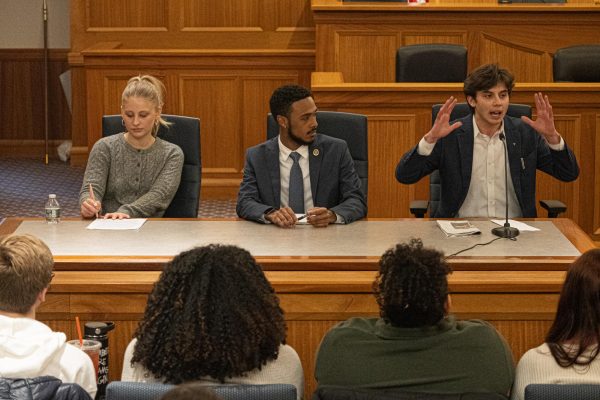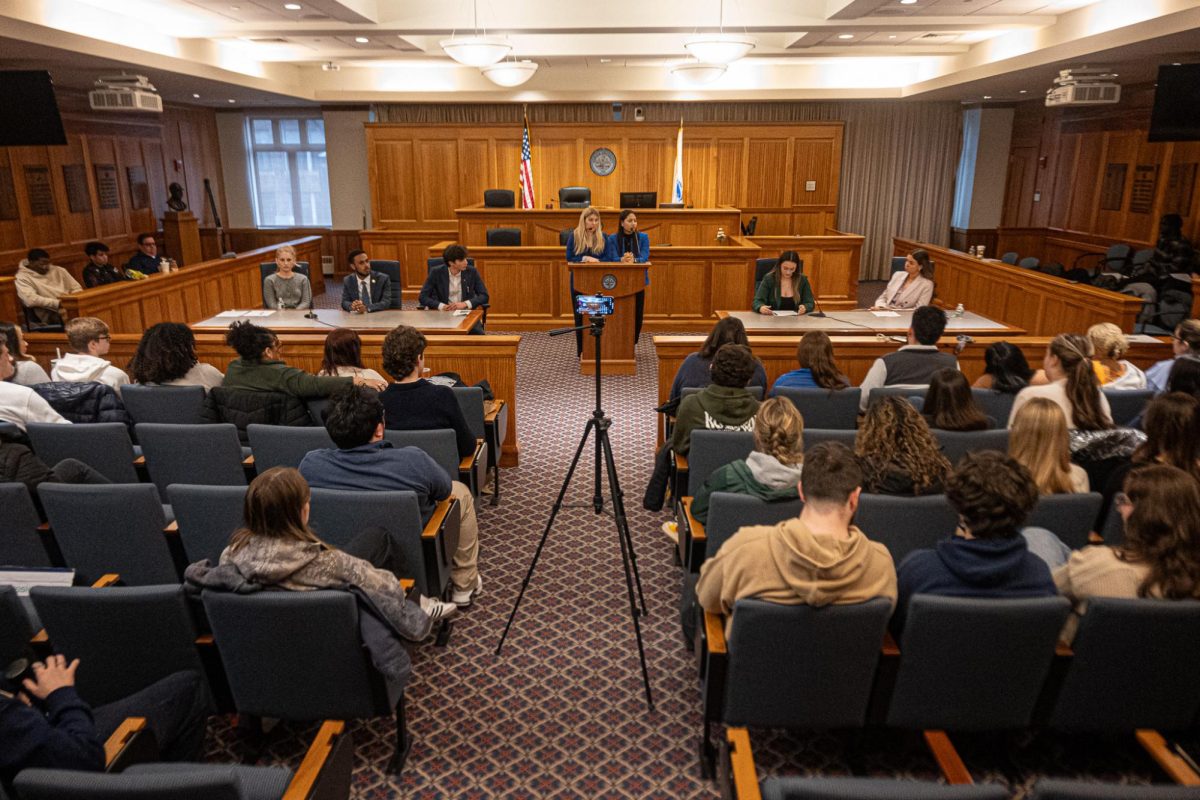Ahead of elections March 3 through 5, the Student Government Association held a candidates forum Feb. 27 as a way for the student body to make an informed decision when they vote.
The forum was sectioned into three parts; two minute speeches about their values and plans if elected, two pre-prepared questions for each position, then the floor was very briefly opened to the audience for questions. The forum was moderated by SGA Vice President Grace Kane and the Student Judiciary Review Board’s secretary Laila Ahmad-Zani.
One of the biggest talking points of the forum was transparency, mostly from Suffolk University’s administration but also between SGA and the general student population. Discussions of the Madrid campus closure and the faculty censure all came back to transparency in the end. For each and every candidate, the routes that they plan to take vary not just from position-to-position but also campaign-to-campaign.
Charlie Reyna-Demes, one of the presidential candidates, is running on the belief that to earn more transparency from Suffolk it will require a “student union.” With a student union, Reyna-Demes hopes for students to stage protests and inform parents, the press and the Boston community of their grievances against the school.
“We can’t just have a heart-to-heart with the school and expect them to change their strategy with us,” said Reyna-Demes in his speech. “As SGA, we need to lead the charge in playing a role in establishing a student union.”
Andrew Gomes, another presidential candidate, spoke briefly on the topic of transparency despite it being the opening of his speech. He agreed that the need for transparency from the university to their top investors, the students, is a must, but believes that comes from consistent and positive communication between the administrators and the students.
The third and final presidential candidate and current SGA Secretary Ruby Walsh insists that a student union is already present and alive at Suffolk. She cites this year as a ‘backbone’ for the furthering of community engagement and student success while maintaining an inclusive and caring atmosphere. Walsh said she wants to use what they already have going for them and push the initiatives and efforts more than before.
“I’ve witnessed first-hand the power and potential that we have as a community when we come together,” said Walsh. “That, I’ll say it again, is our union.”
It wasn’t only the presidential candidates that spoke on transparency. Both candidates for the position of vice president, Julia Karwacki and Kayleigh Carey, referred briefly to transparency.
Karwacki mentioned transparency, focused her speech on affordable education and her experiences as a first-generation student. She emphasized how Suffolk has limited its international outreach with the closure of the Madrid campus and how that can affect future students’ ability to learn from the world around them, not just the city closest to them.
Carey emphasized the need for transparency within SGA. She is running on the belief that SGA could stand to be more accessible for all students. As the needs of the students evolve, Carey firmly believes that SGA should evolve with them.
“I want a better student government. I want a better student body. I want a better Suffolk,” said Carey.
When it comes to the secretary candidates, they spoke about how they plan to lead if elected. While transparency was a talking point, their main points laid with connectivity and the kind of hand they plan to lead with.
Divinety Johnson is running her campaign on the acronym INFINITY, which stands for integrity, inclusion, transparency, fairness, involvement and youth engagement. She defined transparency as clear and concise communication, in general.
Zoe Welz used her speech as a platform to insist that she’s just as committed as her other candidates, distinguishing herself as the only freshman E-board candidate. Welz said that she’s been “invested since day one” and hopes to continue that on by furthering the connections between clubs and SGA if elected.
“I believe that secretary is the backbone of the SGA E-board and I want you guys to know that I’m willing to be that backbone,” said Welz.
Stephanie Lima, if elected, plans to lead with empathy, understanding, honesty and communication. The ways in which she hopes to achieve these goals is through being able to spread information from the senate to those outside of the senate and building rapport with those in SGA so that they feel comfortable communicating their needs with her.
Running unopposed for the position of treasurer, Frank Ezhan delivered a speech that gave voters insight into his plans. Ezhan spoke of years enjoying being someone people can turn to and an outspoken person, but whenever he was presented with an opportunity to lead something, always turning it down.
“‘Why not me? Why not I step up to the plate and take advantage of the moments that I am given and make other people’s lives better throughout the process?’” said Ezhan, in reference to the conversation he previously had with current SGA President Clinton Oreofe that motivated him to run.
Then came the prepared questions, which started with the presidential candidates and finished with treasurer. The first question presented to the presidential candidates was regarding the biggest challenges they expect to face in the coming year.

Walsh said that SGA should take a focus on its response to challenges rather than the challenges that they may or may not face. When faced with setbacks, Walsh wants SGA to be able to channel the initial response energy into a more logical and thought-out course of action.
“Success is not final. Failure is not fatal. It’s the courage to continue that counts,” said Walsh.
One of the problems Gomes expects SGA to face next year is the battle of transparency from the university. Gomes offered options and plans he hopes to enact if elected, including a student representative within the Office of Retention, which is an administrative group that manages Suffolk’s current and past records.
What Gomes strives for is consistent communication between the students and the administration. As an orientation leader, Gomes has had the opportunities to build and keep working relationships with the administration, which he said would benefit communication with administrators.
Reyna-Demes stated that the biggest issues that SGA should expect to face within the next year are internal issues. He argued that going to the administration has proved “futile” in the past three years he has been a SGA senator.
Reyna-Demes referenced the Board of Trustees decision last spring to arm a portion of SUPD officers and the SGA resolution against arming, written by Gomes, highlighting the lack of acknowledgement of SGA from the administration. He referred to stories from The Suffolk Journal during his speech.
Reyna-Demes once again called for a more activism-oriented student union, which he insisted is not present on campus.
The next question asked of the presidential candidates was on the topic of how they plan to ensure the voices of students are heard and one goal they hope to accomplish in office.
Walsh mentioned that she had many goals she wanted to present to the forum, but ultimately landed upon her goal of having “open educational resources” on campus. This is a program that other universities across the nation have started to adopt, in which students have access to free or reduced cost textbooks. According to Walsh, some universities group it in with a student’s tuition cost, limiting out of pocket purchases for students.
Walsh said she has already met with Peter Fowler from the office of retention to get the ball rolling on this process.
“Each and every single one of my goals, there’s already a backbone,” said Walsh.
Gomes spoke heavily about ensuring the voices of students are heard. He said that despite the fact that the freedom of speech is a constitutional right but also in Suffolk’s policies, students still feel unable to fully use their voices.
“That is one thing I want to make clear,” said Gomes, “The freedom of speech of all of you has so much power in it. It transcends beyond any controversial topic or anyone that tries to deem your voice as controversial.”
Gomes says that SGA is already a student union, due to their financial means and deep-rooted connections with the other clubs on campus.
Reyna-Demes wants to bring awareness to the most unheard voices within the Suffolk community — those not involved with clubs or academics, he said. Reyna-Demes believes that SGA campaigns should be run on trying to serve those harder to reach students.
He said he wants more people to attend the SGA meetings and more students to care.
The vice-presidential candidates’ first pre-prepared question regarded SGA’s constitution and bylaws and how the candidates would expand and enforce them.
Carey stated that the current constitution is “amazing,” but said she is a firm believer that there is always room for improvement. She specifically highlighted SGA’s bylaws, claiming that they are out of date and could stand to be updated to align more with modern technology and concepts.
Carey said she has asked senators if they know where to currently find these documents and they don’t know, which is something she wants to amend.
Karwacki agreed with Carey that the bylaws are outdated and need to be re-evaluated, but also proposed concepts that could be added to the bylaws if she is to win the position. Karwacki wants to bring in co-chairs for SGA committees, as being the chair of a committee is a time consuming effort that should be divided as needed.
Karwacki wants accessible transparency and would achieve that through an SGA website that would be a way to expand SGA’s outreach without the limitations of social media.
The second question directed to Kawacki and Carey regarded their plans on expanding SGA’s presence on campus and recruiting new students to get them involved.
Carey mentioned that this year has been a “big” improvement with the outreach that the senate has, but that there is always room for improvement. She calls for more social media, specifically with the constitution and bylaws being present on their Instagram. Carey wants the view of SGA to not be something scary or full of regulation, but rather something that is readily accessible to the students.
“I want people to know the importance of being involved with SGA,” said Carey.
Karwacki mentioned that during her time as an Orientation Leader, she has had to learn how to productively approach different students who have different personalities. She mentioned that SGA is limited by the people who aren’t aware of the purpose that SGA services and she wants to fix that. One way Kawacki plans to achieve that is through hosting training sessions and having clubs feel comfortable to come to SGA for guidance.
The secretary candidates’ first question asked them of previous planning experience as well as what goals they hope to achieve if they are elected into the position.
Welz gave examples of having to plan a high school event for 2,000 people as well as being actively involved with the awards committee. With the SGA awards being one of the bigger events that secretaries have to plan, she felt that already having the insight to that committee is important to learn the in’s and out’s.
Lima’s experience comes from her time as an Orientation Team Leader and the president and founder of the Brazil without Borders club. As far as the fall and winter retreats are concerned, Lima broached the idea of doing an escape room as a means to replicate the high stress situations that might arise while a part of SGA.
Johnson mentioned that this will be her second year as part of the awards committee. Back home in Oklahoma, she also had to be acting speaker for the House of Oklahoma, which included organizing a banquet with them. Johnson also mentioned wanting to bring forth a new SGA award for student activism, something she felt deserving of appreciation.
The second question asked of the secretary candidates was about how they plan to do training during the retreats that SGA takes each semester.
Welz said that she wants to expand upon what’s already there, things like icebreakers and team building exercises. For the Winter retreat, instead of doing something different, she’d like it to fall more inline with the Fall retreat.
Lima’s focus is on the specific skills she’d like to enhance during these training sessions. Problem-solving was one that she felt could be built through escape rooms. Trust was another skill that Lima wanted to expand upon, as the senate has its niches and she’d rather the senate as a whole be more connected. She also wanted to establish group goals within the committees and the E-board, so the actions they take have reasons behind them.
Johnson specifically mentioned that during her time in SGA she enjoyed being presented with a random problem and having to come up with a solution on the fly. This is something she’d like to continue as it not only builds connections within SGA but also shows what skills need work.
The first question directed to Ezhan surrounded SGA spending and what change he would bring. Ezhan specifically called out how the SGA concert costs $250,000 and roughly 80 people were in attendance. Doing some quick math on the spot, Ezhan estimated that to be about $300 per person. He said that he would rather spend that money on things that students actually would attend and appreciate, like sporting events or food centered events.
Ezhan was also asked if he believes the role of treasurer to require more of a consistent or flexible guidance. He said that being treasurer isn’t a “black and white” circumstance but rather dependent on the context of the situation. To be SGA treasurer, Ezhan felt that it was all about balance.
Due to time constraints, the audience question section of the forum was cut short, only allowing for one question. The audience question was directed to the presidential candidates about what smaller changes they would bring to campus if elected.
Coming off of his proposed resolution to lower the price of replacement student ID cards from $25 to $10, Reyna-Demes suggested students have the option of digital student ID cards.
Gomes said he already has a draft done for a SGA website to improve the outreach of student government along with having a FAQ section for those who want to start a new club.
For Walsh, she said she would implement easily accessible eco-friendly menstrual products in the restrooms, a conversation she’s already having with Planned Parenthood Generation Action.




















